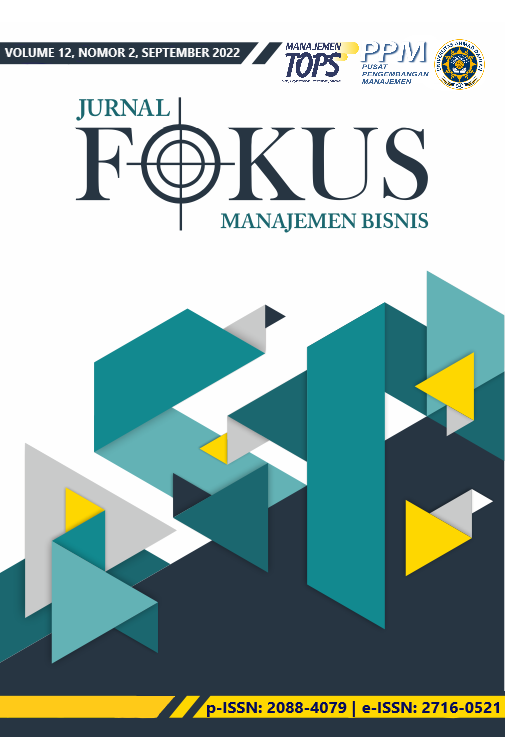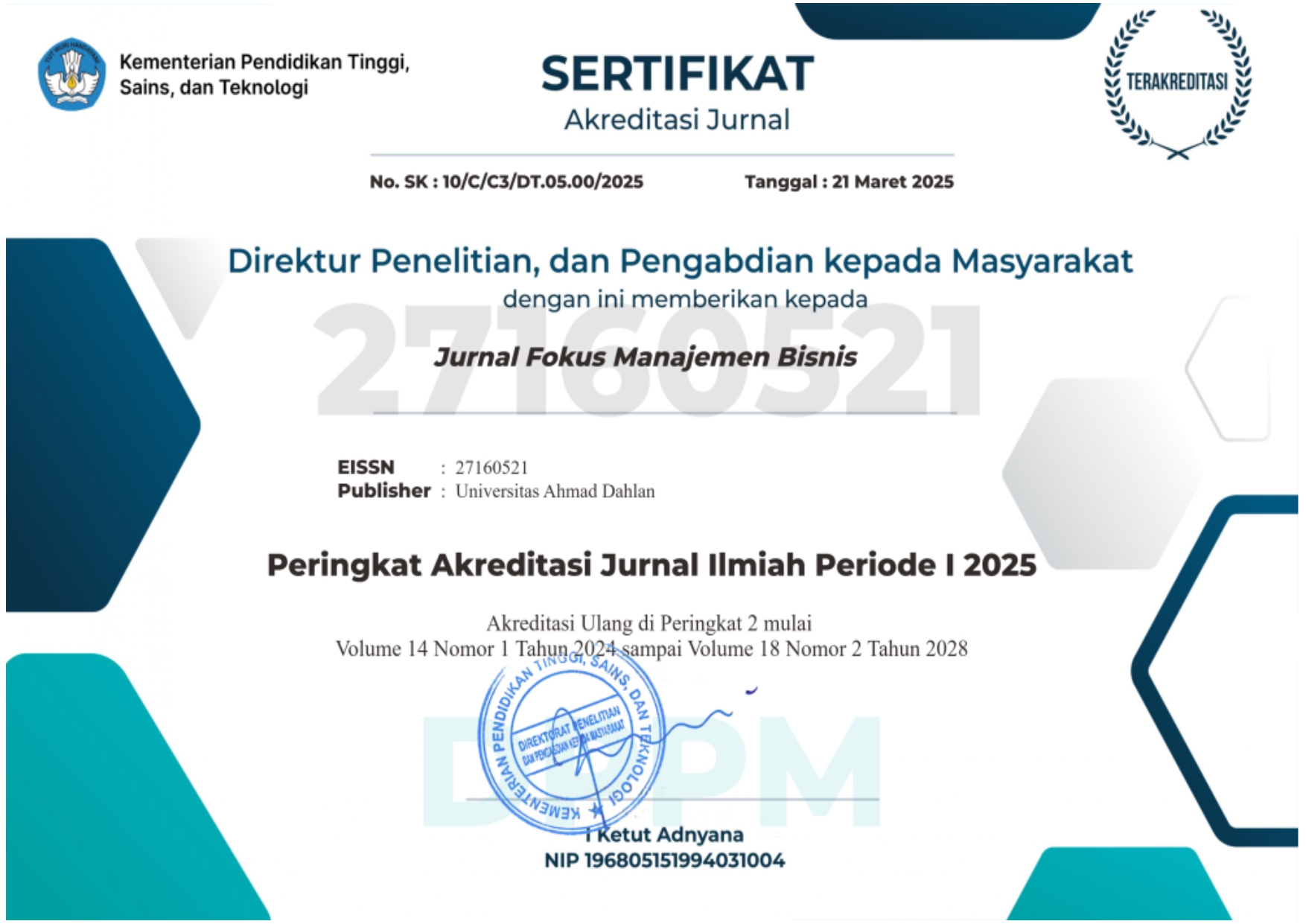PENGARUH RELIGIOSITAS TERHADAP PENCIPTAAN BISNIS: PERAN PEMEDIASI ORIENTASI KEWIRAUSAHAAN INDIVIDU DAN SIKAP BERBAGI PENGETAHUAN
DOI:
https://doi.org/10.12928/fokus.v12i2.6087Abstract
The purpose of this study was to examine the role of individual entrepreneurial orientation and knowledge-sharing attitudes on the influence of religion on the creation of new businesses. Data were collected from 300 millennial and post-millennial generations in Yogyakarta. Regression analysis with bootstrap method was used to test the hypothesis. The results prove that religiosity has a positive effect on the creation of new businesses, individual entrepreneurial orientation mediates the effect of religiosity on the creation of new businesses, and knowledge sharing attitudes mediate the effect of new business creation. The limitation of this study lies in the ability to explain the variations and dynamics of the new business creation process that differs from the identified stages.
References
Aldrich, H., & Zimmer, C. (1986). Entrepreneurship Through Social Networks. The Art and Science of Entrepreneurship, July, 3–23.
Allport, G. W., & Ross, J. M. (1967). Personal Religious Orientation and Prejudice. Journal of Personality and Social Psychology, 5(4).
Audretsch, D. B., Bönte, W., & Tamvada, J. P. (2013). Religion, Social Class, And Entrepreneurial Choice. Journal of Business Venturing, 28(6).
Azam, A., Fu, Q., Abdullah, I., & Abbas, S. A. (2011). Impact of 5-D of Religiosity on Diffusion Rate of Innovation. International Journal of Business & Social Science, 2(17).
Balog, A. M., Baker, L. T., & Walker, A. G. (2014). Religiosity And Spirituality In Entrepreneurship: A Review And Research Agenda. Journal of Management, Spirituality and Religion, 11(2).
Bandura, A. (1986). The Explanatory and Predictive Scope of Self-Efficacy Theory. Journal of Social and Clinical Psychology, 4(3).
Baron, R. M., & Kenny, D. A. (1986). The Moderator–Mediator Variable Distinction In Social Psychological Research: Conceptual, Strategic, And Statistical Considerations. Journal of Personality and Social Psychology, 51(6).
Baruch, Y., & Holtom, B. C. (2008). Survey Response Rate Levels And Trends In Organizational Research. Human Relations, 61(8).
Bencsik, A., & Machova, R. (2016). Knowledge Sharing Problems From The Viewpoint Of Intergeneration Management. Proceedings of the 4th International Conference on Management, Leadership and Governance, ICMLG 2016.
Bock, G. W., & Kim, Y. G. (2002). Breaking the Myths of Rewards: An Exploratory Study of Attitudes About Knowledge Sharing. Information Resources Management Journal (IRMJ), 15(2), 14–21.
Bolton, D. L., & Lane, M. D. (2012). Individual Entrepreneurial Orientation: Further Investigation of a Measurement Instrument. Academy of Entrepreneurship Journal, 18(1), 91–98.
Bourdieu, P. (2011). The Forms of Capital. Cultural Theory: An Anthology, 1.
Brockhouse, R. T., & Pinkham, J. R. (1980). Assessment Of Nonverbal Communication In Children. ASDC Journal of Dentistry for Children, 47(1).
Carswell, P., & Rolland, D. (2007). Religion and entrepreneurship in New Zealand. Journal of Enterprising Communities: People and Places in the Global Economy, 1(2).
Compeau, D. R., & Higgins, C. A. (1995). Application Of Social Cognitive Theory To Training For Computer Skills. Information Systems Research, 6(2).
De Carolis, D. M., & Saparito, P. (2006). Social Capital, Cognition, And Entrepreneurial Opportunities: A Theoretical Framework. Entrepreneurship: Theory and Practice, 30(1).
Dimock, M. (2018). Defining Generations : Where Millennials End And Post-Millennials Begin. Pew Research Center.
Dodd, S. D., & Seaman, P. T. (1998). Religion and Enterprise: An Introductory Exploration. Entrepreneurship Theory and Practice, 23(1).
Dufays, F., & Huybrechts, B. (2014). Connecting the Dots for Social Value: A Review on Social Networks and Social Entrepreneurship. Journal of Social Entrepreneurship, 5(2).
Ferguson, T. W., Dougherty, K. D., & Neubert, M. J. (2014a). Religious Orthodoxy and Entrepreneurial Risk-Taking. Sociological Focus, 47(1), 32–44.
Gatewood, E. J., Shaver, K. G., & Gartner, W. B. (1995). A Longitudinal Study Of Cognitive Factors Influencing Start-Up Behaviors And Success At Venture Creation. Journal of Business Venturing, 10(5).
Giddens, A. (1984). The Constitution of Society: Outline of The Theory of Structuration. Univ of California Press.
Hair, J. F., Black, W. C., Babin, B. J., & Anderson, R. E. (2010). Multivariate Data Analysis. In Vectors.
Håkansson, H., & Snehota, I. (1995). Developing Relationships in Business Networks. Routledge.
Henley, A. (2017). Does Religion Influence Entrepreneurial Behaviour? International Small Business Journal: Researching Entrepreneurship, 35(5).
Katz, J., & Gartner, W. B. (2016). Properties Of Emerging Organizations. In Entrepreneurship as Organizing: Selected Papers of William B. Gartner.
Kelly, J. R., Stark, R., & Glock, C. Y. (1968). American Piety: The Nature of Religious Commitment. Sociological Analysis, 29(3).
Kropp, F., Lindsay, N. J., & Shoham, A. (2008). Entrepreneurial Orientation and International Entrepreneurial Business Venture Startup. International Journal of Entrepreneurial Behavior & Research, 14(2), 102–117.
Kuckertz, A., Kollmann, T., Krell, P., & Stöckmann, C. (2017). Understanding, Differentiating, And Measuring Opportunity Recognition And Opportunity Exploitation. International Journal of Entrepreneurial Behaviour and Research, 23(1).
Lingelbach, D., Patino, A., & Pitta, D. A. (2012). The Emergence Of Marketing In Millennial New Ventures. In Journal of Consumer Marketing (Vol. 29, Issue 2).
Lumpkin, G. T., & Dess, G. G. (1996). Clarifying The Entrepreneurial Orientation Construct And Linking It To Performance. Academy of Management Review, 21(1).
Miles, R. E., Snow, C. C., Meyer, A. D., & Coleman, H. J. (1978). Organizational Strategy, Structure, And Process. Academy of Management Review. Academy of Management, 3(3).
Miller, D. (2011). Miller (1983) revisited: A Reflection On EO Research And Some Suggestions For The Future. Entrepreneurship: Theory and Practice, 35(5).
Minns, C., & Rizov, M. (2005). The Spirit Of Capitalism? Ethnicity, Religion, And Self-Employment In Early 20th Century Canada. Explorations in Economic History, 42(2).
Moroz, P. W., & Hindle, K. (2012). Entrepreneurship as a Process: Toward Harmonizing Multiple Perspectives. Entrepreneurship: Theory and Practice, 36(4).
Muhamad, N., & Mizerski, D. (2010). The Constructs Mediating Religions’ Influence on Buyers and Consumers. Journal of Islamic Marketing, 1(2), 124–135.
Murtaza, G., Abbas, M., Raja, U., Roques, O., Khalid, A., & Mushtaq, R. (2016). Impact of Islamic Work Ethics on Organizational Citizenship Behaviors and Knowledge-Sharing Behaviors. Journal of Business Ethics, 133(2).
Nair, K. R. G., & Pandey, A. (2006). Characteristics of Entrepreneurs. The Journal of Entrepreneurship, 15(1).
Ngah, R., Wahyukaton, Salleh, Z., & Sarmidy, R. (2016). Comparative Study of Emotional Intelligence and Entrepreneurial Orientation Between Malaysian and Indonesian University Students. Procedia Economics and Finance, 37.
Nwankwo, S., Gbadamosi, A., & Ojo, S. (2012). Religion, Spirituality And Entrepreneurship: The Church As Entrepreneurial Space Among British Africans. Society and Business Review, 7(2).
Ozgen, E., & Baron, R. A. (2007). Social Sources Of Information In Opportunity Recognition: Effects Of Mentors, Industry Networks, And Professional Forums. Journal of Business Venturing, 22(2).
Pisano, G. P. (2017). Toward A Prescriptive Theory Of Dynamic Capabilities: Connecting Strategic Choice, Learning, And Competition. Industrial and Corporate Change, 26(5).
Preacher, K. J., & Hayes, A. F. (2004). SPSS and SAS Procedures for Estimating Indirect Effects in Simple Mediation Models. Behavior Research Methods. Behavior Research Methods, Instruments, & Computers, 36(4).
Preacher, K. J., & Hayes, A. F. (2008). Asymptotic And Resampling Strategies For Assessing And Comparing Indirect Effects In Multiple Mediator Models. Behavior Research Methods, 40(3).
Răban-Motounu, N., & Vitalia, I. L. (2015). Religiosity and Proactive Coping with Social Difficulties in Romanian Adolescents. Journal of Religion and Health, 54(5).
Rauch, A., Wiklund, J., Lumpkin, G. T., & Frese, M. (2009). Entrepreneurial Orientation And Business Performance: An Assessment Of Past Research And Suggestions For The Future. Entrepreneurship: Theory and Practice, 33(3).
Romer, P. M. (1994). The Origins of Endogenous Growth. Journal of Economic Perspectives, 8(1).
Rost, K. (2011). The Strength Of Strong Ties In The Creation Of Innovation. Research Policy, 40(4).
Sachitra, V., & Siong-Choy, C. (2019). The Moderating Effect Of Religiosity On Resource-Capability-Competitive Advantage Interaction: Empirical Evidence From Sri Lankan Agribusiness Farm Owners. International Journal of Social Economics, 46(5).
Salamzadeh, A. (2015). New Venture Creation: Controversial Perspectives and Theories. Economic Analysis, 48(1984).
Salkowitz, R. (2010). Young World Rising: How Youth, Technology and Entrepreneurship are Changing the World from the Bottom Up. John Wiley & Sons.
Sekaran, U., & Bougie, R. (2009). Research Method for Business Textbook: A Skill Building Approach. John Wiley & Sons Ltd.
Shane, S., & Venkataraman, S. (2000). The Promise Of Entrepreneurship As A Field Of Research. Academy of Management Review, 25(1).
Stewart, W. H., & Roth, P. L. (2001). Risk Propensity Differences Between Entrepreneurs And Managers: A Meta-Analytic Review. In Journal of Applied Psychology (Vol. 86, Issue 1).
Takeuchi, H. (2001). Toward a Universal Management Concept of Knowledge. In I. Nonaka & D. Tecce (Eds.), Managing Industrial Knowledge (Vol. 34, Issue 1, pp. 315–329). Sage Publication.
Wang, S., & Noe, R. A. (2010). Knowledge Sharing: A Review And Directions For Future Research. Human Resource Management Review, 20(2). https://doi.org/10.1016/j.hrmr.2009.10.001
Warren, S., & Fineman, S. (2013). Don’t Get Me Wrong, It’s Fun Here, But…: Ambivalence And Paradox In A ‘Fun’ Work Environment. In Humour, Work and Organization (Pp. 98-118).
White, J. E. (2017). Meet Generation Z: Understanding and Reaching the New Post-Christian World. In BakerBooks.
Woodrum, E. (1985). Religion And Economics Among Japanese Americans: A Weberian Study. Social Forces, 64(1).
Wu, J. (2009). Entrepreneurial Orientation, Entrepreneurial Intent and New Venture Creation : Test of a Framework in a Chinese Context. In Virginia Polytechnic Institute and State University, USA.
Zhao, X., Lynch, J. G., & Chen, Q. (2010). Reconsidering Baron And Kenny: Myths And Truths About Mediation Analysis. Journal of Consumer Research, 37(2).
Downloads
Published
How to Cite
Issue
Section
License
Copyright (c) 2022 Muhammad Hamdi, Rikha Muftia Khoirunnisa

This work is licensed under a Creative Commons Attribution-ShareAlike 4.0 International License.
Authors who publish with this journal agree to the following terms:Â
- Authors retain copyright and grant the journal right of first publication with the work simultaneously licensed under a Creative Commons Attribution License that allows others to share the work with an acknowledgment of the work's authorship and initial publication in this journal.
- Authors are able to enter into separate, additional contractual arrangements for the non-exclusive distribution of the journal's published version of the work (e.g., post it to an institutional repository or publish it in a book), with an acknowledgment of its initial publication in this journal.
- Authors are permitted and encouraged to post their work online (e.g., in institutional repositories or on their website) prior to and during the submission process, as it can lead to productive exchanges, as well as earlier and greater citation of published work (See The Effect of Open Access).







